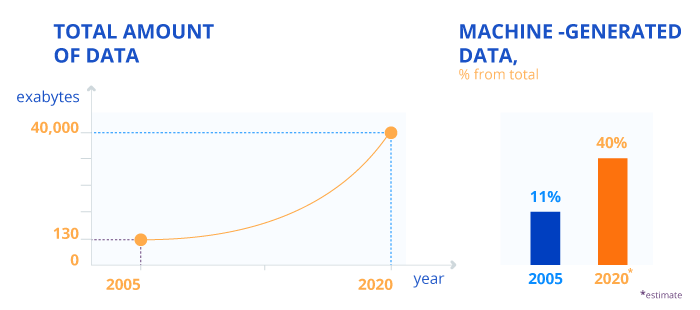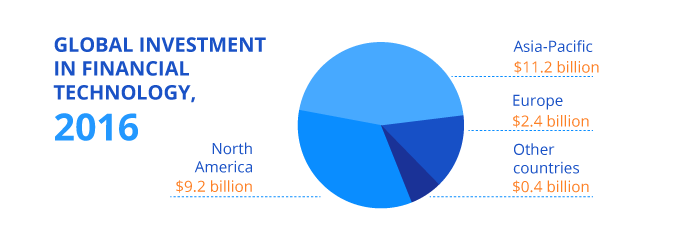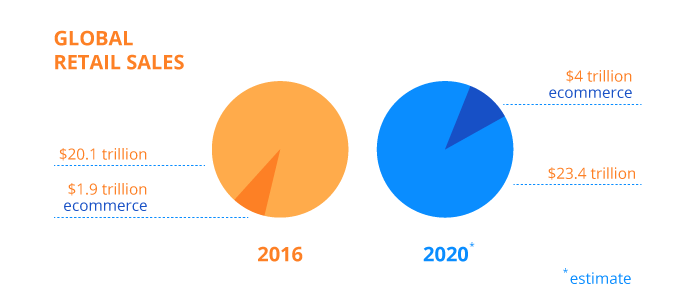-
Product Management
Software Testing
Technology Consulting
-
Multi-Vendor Marketplace
Online StoreCreate an online store with unique design and features at minimal cost using our MarketAge solutionCustom MarketplaceGet a unique, scalable, and cost-effective online marketplace with minimum time to marketTelemedicine SoftwareGet a cost-efficient, HIPAA-compliant telemedicine solution tailored to your facility's requirementsChat AppGet a customizable chat solution to connect users across multiple apps and platformsCustom Booking SystemImprove your business operations and expand to new markets with our appointment booking solutionVideo ConferencingAdjust our video conferencing solution for your business needsFor EnterpriseScale, automate, and improve business processes in your enterprise with our custom software solutionsFor StartupsTurn your startup ideas into viable, value-driven, and commercially successful software solutions -
-
- Case Studies
- Blog
Artificial Intelligence Solutions that Help Your Business
In the 20th century, oil was the driving force of the global economy. In the 21st century, it’s data. It’s literally everywhere. The digital world is the world of data.
According to the Digital Universe study conducted by the International Data Corporation, the total amount of data on the planet doubles every two years and is expected to reach 40 zettabytes by 2020. This exponential growth is driven by machine-generated data: in 2005, machine-generated data accounted for 11% of all data in the digital universe, but that share is likely to be over 40% by 2020.
Data is useless, however, if it isn’t properly structured and analyzed. Gigantic volumes of untapped information can be structured and used for analysis (as of 2012, only 3% of data was tagged and only 0.5% was analyzed); these huge volumes are usually called big data.
Big data creates enormous opportunities for artificial intelligence (AI) and its subset, machine learning (ML). While the term “artificial intelligence” is familiar to almost anyone, few people know what “machine learning” means. Let’s clarify this term in order to avoid confusion. Artificial intelligence is a science of developing intelligent computers. Machine learning, in turn, is a subset of artificial intelligence that is focused on giving computers the ability to teach themselves.
Machine learning is implemented through deep learning, a technique based on artificial neural networks. In a human brain, neurons connect to other neurons randomly, but artificial neural networks have certain layers of data diffusion. The data is passed from layer to layer till the last layer produces the final output. An artificial neural network requires training: if a deep learning algorithm processes and analyzes a lot of data, it'll be able to give the most probable answer.
In other words, artificial intelligence is a concept, and machine learning is an approach to achieving AI, while deep learning is an actual technique for implementing AI today.
Modern deep learning algorithms can mine zettabytes of untapped data for valuable information. Nowadays, artificial intelligence solutions have widespread commercial use in many industries, and no doubt they’ll have even more applications in the future.

Artificial Intelligence: a Sphere of Booming Investment
Today, a combination of software with advanced algorithms and high-performance hardware gives a major boost to the development of artificial intelligence and machine learning. There is literally a mini boom in this sphere: according to data provided by CB Insights, 100 artificial intelligence startups have raised $3.8 billion since 2012. Needless to mention, large corporations, such as Google, Facebook, and Amazon, are ahead of the curve in the research and implementation of AI.
There’s little doubt that artificial intelligence will transform multiple industries: from the financial sector and business development to healthcare and real estate. Many companies already apply AI, and more are expected to follow the lead in the short run. Artificial intelligence helps businesses solve multiple problems, bringing financial benefits and improving efficiency. We've selected the most common current uses of artificial intelligence in the real world.
Artificial Intelligence in Finance
Financial technology has always been open to innovations. Banks were among the first institutions that started using computers to provide services. The rapid development of the digital world has revolutionized the financial sector. Just consider this example: in the 20th century, people couldn’t transfer money or secure a loan without banks; now, there are plenty of online money transfer and loan services.
Fintech companies are booming nowadays. According to a survey by Accenture, in 2016, global investment in fintech ventures amounted to $23.2 billion (+10% year-on-year). Cryptocurrencies, crowdfunding, and online payments are only the most prominent examples of innovations brought into this sector since the beginning of the 21st century.

Artificial intelligence is the latest trend in financial technologies. Both small startups and large institutions apply AI in order to provide faster and safer services for their clients. Let’s go over the biggest benefits artificial intelligence brings to finance.
Safer Trading
In the 20th century, trading relied mainly on price fluctuations and guessing. Financial analysts kept track of prices and indices, trying to make the best financial decisions. Of course, it was a matter of each person’s expertise and good luck.
AI makes trading easier and less risky. Large financial institutions (such as banks and hedge funds) have already started to use artificial intelligence planning in finance. Smart machine learning algorithms can make fast automated decisions based on a huge amount of data; this is particularly useful in high-frequency trading.
One of the successful examples of artificial intelligence in finance is a Paris-based startup called Walnut Algorithms, which is developing a cutting-edge algorithmic trading system based on advanced machine learning and data science. Walnut Algorithms aims at creating 100% return investment strategies. The company’s AI engine is able to spot trading patterns, analyze them, and adapt to ever-changing market conditions.
Fraud Prevention
Millions of financial transactions are carried out every day, and detecting cases of fraud is a major challenge. How does a payment system know that a transaction is genuine and authorized? The use of machine learning algorithms is a key element of financial security. Machine learning algorithms analyze user behavior to check whether a certain action might be fraudulent.
Machine learning systems must be able to minimize the number of false positives, when actions are flagged as suspicious while in reality they’re authorized. AI algorithms must evolve and learn automatically in order to predict what tactics will be used by fraudsters – and prevent them.
Kount is an example of a groundbreaking artificial intelligence fraud prevention platform that helps businesses increase their sales. The company’s proprietary technology analyzes the data received from billions of transactions in order to detect and fend off fraudulent activity.
Fraud is a major concern for insurance companies, too, as they need to minimize losses and avoid improper payouts. Modern AI-powered solutions, such as the SAS Fraud Framework, use sophisticated algorithms and in-depth analytics to detect fraud and abuse.
Personalized Investment Plans
According to an article by Time, 33% of Americans don’t have a retirement plan at all, while 23% have petty sums of less than $10,000. With such poor figures, millions of people in the US are likely to face lower standards of living when they retire. Obviously, people need personalized investment plans that will consider each person’s finances individually.

Artificial intelligence is particularly useful when it comes to personalization of investment services. Many financial institutions already apply so-called robo-advisors (i.e. machine learning algorithms) to assist clients with investment decisions. These systems not only choose the best assets to invest in but also analyze market trends and automatically make adjustments to plans. Robo-advisors are very flexible, and can manage investment plans for clients with various asset levels.
Having an AI investment assistant means clients don’t need personal advisors. But there are more financial advantages: smart computer systems react to minor changes in the market in a matter of seconds, reducing losses and boosting profits. In the end, clients get better returns.
Betterment is a great example of how artificial intelligence can maximize the effectiveness of investment administration, personalizing each client’s portfolio allocation and managing it automatically. Betterment optimizes investments, provides optimum returns, and ensures tax efficiency.
Artificial Intelligence in Marketing
Digital marketing is a sphere of ample opportunities for artificial intelligence. Research conducted by Demandbase reveals that 80% of marketing executives believe AI will bring revolutionary changes to this industry, yet only 10% of them use artificial intelligence technologies in business administration. No doubt, AI is going to become the cornerstone of marketing.
There are plenty of ways that machine learning algorithms can help marketers do their jobs. The goal of marketing is to boost sales and to launch profit-generating campaigns. This requires making decisions based on huge amounts of business data and analytics, which is just where AI comes in handy!
AI brings many advantages to marketers, so let’s briefly go over the most important.
Automating Repetitive Tasks
Today, the majority of marketers need to perform pretty similar tasks that take a lot of time and decrease productivity. These include social media and email marketing and lead management. Having such tasks fulfilled by AI, marketers can focus on creative and new ideas. Modern machine learning algorithms allow marketers to automate email and social media marketing as well as other similar tasks. Also, AI provides marketers with predictive analytics.
There are a number of companies offering marketing automation tools. For example, Marketo helps to build campaigns, attract and retain customers, and perform thorough performance analyses. The company’s platform uses machine learning for sales forecasting and predicting user behavior.
Another example of artificial intelligence is Lucy, a smart marketing platform by Equals 3. Lucy is a cloud-based tool that performs in-depth research by analyzing enormous amounts of data, draws complex portraits of target markets, and builds adjustable marketing strategies.
Increasing Sales Through Images and Videos
Images have always played a crucial role in marketing: ads on billboards along the roads, nice posters, magazines full of beautiful images, and other visual stimuli have been used to attract clients’ attention. Today, with around 2 billion mobile social media users, marketers should take image-centric social media platforms into account in order to boost sales. But how should they do it? Artificial intelligence gives an answer: image recognition! According to research by Research and Markets, in 2016 the image recognition market was worth almost $16 billion, and is expected to grow to nearly $39 billion within five years.
Modern machine learning algorithms can process and analyze pictures in order to automatically recognize certain objects in a picture. How exactly does it work? Social media users can simply scan a photo or an image to identify, for example, a piece of clothing or a gadget. AI-enabled software will quickly find the price for these items in the nearest shops or online stores, and the client will be able to make a purchase.
Moreover, artificial intelligence can go beyond image identification: AI can recognize objects in videos as well. Object recognition in videos provides even more advantages to marketers, as consumers can search for items they see in movies or promo videos, for instance.
There are many examples of artificial intelligence in marketing, including Markable, which offers an advanced AI algorithm that can recognize multiple objects in images and videos. Apart from that, the service provides some cutting-edge analytical tools for a better understanding of customers.
Faster Content Generation
Though images, videos, and animations are driving modern content marketing strategies, textual content is still important. However, writing good, unique, and easy-to-read texts isn’t simple.The major problem is that authors need time to research topics and generate cohesive texts.
Writing can be a challenge for people, but it’s simple for artificial intelligence. Modern AI algorithms can generate unique and relevant content on various topics. Thus, artificial intelligence saves time and money, as unique articles can be generated within minutes.
Articoolo’s content creator is an example of this type of AI-enabled technology. It can not only write an article, but even analyze a topic and research the best resources to take information from. The company’s AI algorithm never produces plagiarized text, which means there will be no problems with uniqueness.
Artificial Intelligence in Customer Support
Customer support is about the interaction between a client and a company. No matter what kind of business a company is in, it needs to provide assistance to its clients. People always have questions and problems when dealing with institutions (like banks or insurance companies), retailers, and service providers. Of course, the digital world isn’t an exception; people sometimes need support when using online services and apps.
Businesses shouldn’t underestimate the importance of support. According to an article by Forbes, companies lose $62 billion per year due to poor customer experience. This figure is really frightening for marketers and financial analysts. A positive customer experience builds trust and creates brand awareness.
Companies are facing some challenges when providing customer service, and artificial intelligence is the best solution.
Handling Multiple Customers at a Time
Very often, companies fail to provide helpful client support due to a lack of employees. Artificial intelligence helps to alleviate this problem with robotic advisors or, in other words, chatbots.
Chatbots are becoming widespread, since the implementation of artificial intelligence makes them extremely helpful: unlike people, a single chatbot can answer the questions of thousands of clients at a time. Needless to say, using a chatbot is far cheaper than hiring a team of human support specialists. Chatbots are used at the call centers and customer support services of many companies. Sometimes, people don’t even know they’re chatting with bots!
In the past, chatbots were based on multiple-choice scripts, but the rapid development of AI has made them much smarter. Thanks to deep learning algorithms, chatbots can analyze client messages, suggest the best answers, and learn.
DigitalGenius is an example of such AI solutions for businesses. This software combines human and artificial intelligence to provide effective customer support. If the DigitalGenius chatbot is 100% confident about the answer to an enquiry, it will send a response automatically. For more complicated tasks, a human assistant will take the reins.
More Effective Phone Support
Though chatbots are becoming more and more popular, phone conversations are still the best way to provide informative support. However, not all callers remain satisfied with the assistance they get. The reasons may be different, but one thing is for sure: there must be a good rapport between a client and a support agent. That’s where AI comes in handy!
Artificial intelligence can be applied to make a live conversation more engaging by analyzing the way both the caller and the support specialist are speaking and by giving guidance to the specialist. That’s just the way the AI solution developed by Cogito works.Thanks to this technology, business owners can know that their clients’ problems will be solved on time.
Artificial Intelligence in Medicine
Healthcare is a sector where innovation plays a significant part. New approaches and technologies make medicine more efficient and help save human lives. However, providing top-tier medical services for millions of people isn’t cheap.
According to data published by the Centers for Medicare and Medicaid Services (CMS), in 2015, total healthcare expenditures in the US accounted for $3.2 trillion, or nearly $10,000 per capita. Despite such high spending, a study by The Commonwealth Fund reveals that the life expectancy in the US is the lowest (78.8 years) among the OECD countries (median 81.2 years).
Obviously, the healthcare system must be improved in order to be more efficient. Artificial intelligence can be a cornerstone for the 21st-century healthcare system. Let’s have a look at some of the advantages AI can provide.
Mining Valuable Information From Untapped Data
Medical institutions accumulate huge amounts of records about their patients. Most of this data isn’t structured or tagged, which means it isn’t used. But this data may come in handy for diagnostics and analysis. Machine learning algorithms can mine medical records for valuable information.
For example, AI can predict who is likely to be readmitted. Based on this information, doctors can develop cost-effective treatment plans and provide the highest quality of healthcare possible. Healthcare professionals can benefit from using SAS Visual Analytics, an all-in-one application for analytics, data exploration, and reporting.
Another prominent example of AI in medicine is the DeepMind project carried out by Google; DeepMind processes medical records to provide faster and better treatment. CareSkore, an end-to-end health management platform, utilizes a groundbreaking Zeus AI algorithm that delivers risk profiles of patients, allowing hospitals to improve their bottom lines.
Creating Effective Treatment Plans
Though it sounds like a simple task, even qualified and experienced doctors struggle to come up with the most efficient treatment plans due to lack of data. When it comes to health, a lot of things matter: not just the current test results but previous records, family data, etc. Artificial intelligence can aggregate this information to help doctors select the best treatment for each patient.
IBM’s Watson project is an example of how helpful AI can be in the field of medicine. Watson helps oncologists determine the best treatment pathways through analyzing a lot of data. The program’s artificial intelligence can even offer several treatment plans to choose among.
Providing More Efficient Primary Care
According to a report by Dell EMC, by 2020 there will be a shortfall of about 20,000 primary care physicians in the US due to the growing number of elderly people who will need medical care. This means that many patients won’t receive proper treatment.
Artificial intelligence will be particularly useful to deal with such healthcare issues, as AI-powered bots can provide patients with primary care without the need to visit a doctor. This will save patients’ money as well. And with bots, doctors will be able to focus on patients with urgent health issues.
Sensely, a California-based startup, has created the world’s first virtual nurse. This virtual nurse uses machine learning algorithms to monitor and guide patients suffering from congestive heart failure, diabetes, and behavioral health problems.
A solution developed by AiCure combines artificial intelligence with patients’ gadgets (smartphones and tablets) to monitor whether they adhere to prescriptions. The company’s AI system utilizes such high-end technologies as facial recognition, medication identification, and fraud detection.
Artificial Intelligence in Real Estate
Real estate has always been a challenging industry. Buyers want better locations, more amenities, cleaner areas, better safety, and – in most cases – lower prices. Agents and brokers have a hard time finding properties that meet their clients’ requirements.
Artificial intelligence can help real estate agents and property owners do their jobs better, faster, and easier, and consumers can get what they want without year-long searches. Here are the most common applications of machine learning in the real estate industry.
Better And Faster Communication
It takes some time till buyers meet agents and tell them what kind of property they want. Artificial intelligence is able to help agents better understand their clients’ needs by means of smart assistants or, in other words, real estate chatbots.
Chatbots are used in many industries, and real estate isn’t an exception. An AI-enabled system can process the information it receives, analyze it, and even offer relevant options. Based on machine learning algorithms, chatbots can analyze the characteristics of every property. Moreover, bots store these analyses, so agents can quickly find the information they need.
Apartment Ocean is a successful example of how AI can be used in real estate services to automate the initial contact between a client and an agent. The Apartment Ocean chatbot asks several questions to find out what a client wants and provides agents with leads.
Automating Property Valuation
Property valuation is among the most important parts of real estate agent’s job. This process takes a lot of time and effort. Real estate agents and property developers should take many aspects into account: location, neighborhood, zoning, demographics, competitors, and more. All this research is time-consuming, and in the end owners might not even sell their properties.
Developers, agents, and homeowners can leverage artificial intelligence to automate property valuation, however. Modern AI algorithms can collect and analyze relevant data about properties, sparing real estate agents and investors from unnecessary and inefficient work.
Property valuation AI solutions are indeed being developed. For example, CityBldr uses machine learning to provide owners, developers, and investors with information about their properties. Apart from valuation, this AI technology promotes properties to potential investors.
Promoting Rental Booking
Today, traveling is popular as never before. It’s probably difficult to find someone who doesn’t like traveling. The vacation rental industry is booming! Millions of people prefer saving up and finding rentals on their own instead of staying at hotels. Thanks to the internet, finding a nice place in nearly any part of the world is easy. A number of online vacation booking services (Airbnb being the most famous) have launched in recent years.
Hosts seek to attract guests in order to increase profits. Yet the competition on this market is high, so hosts need to quote reasonable prices. Charging too little brings little profit, whereas charging too much might scare renters away. Artificial intelligence can come to the rescue!
Thanks to AI, online rental services can provide hosts with price tips, increasing the probability of attracting new clients. For example, Aerosolve (a service used by Airbnb) uses machine learning to provide dynamic pricing. This smart algorithm analyzes data about each property (local events, neighborhood, number of reviews) and shows hosts a recommended price. This way, hosts can choose the right business strategy and make more money.
Artificial Intelligence in Retail
Sales are the backbone of the modern free market. According to a study by eMarketer, in 2016, global retail sales were expected to reach $22 trillion, with retail ecommerce sales accounting for $1.9 trillion. With the growing number of internet users, retail ecommerce sales are likely to expand to $4 trillion by 2020. For sure, it’s a large slice of pie for marketers, who are racking their brains trying to boost online sales and attract more customers.

What does this have to do with artificial intelligence? AI offers a lot of advantages to both consumers and marketers, so let’s go over the biggest of them.
Relevant Product Recommendations
In a conventional store, a sales assistant can recommend items that a buyer might want. But it doesn’t work this way in an online store. Many internet users don’t wish to spend hours looking through dozens of products. Instead, they want shopping to be simple and intuitive.
Artificial intelligence can easily provide customers with relevant recommendations that increase the likelihood of extra purchases. AI algorithms can analyze user behavior and lots of other data to provide personalized recommendations. As a result, different customers receive totally different product suggestions.
Brilliance is an example of an AI-based product recommendation solution. The engine used by Brilliance is self-learning, so suggestions get better and more relevant over time. Moreover, this artificial intelligence solution is helpful for marketers, since it can automatically send personalized emails with product recommendations.
Needless to say, similar AI algorithms are extensively used by large companies such as Amazon.
Customer Engagement
In the past, digital retailers, unlike conventional retailers, lacked one important thing: a personalized customer experience. Instead of browsing through menus on a website or in an application, customers would simply quit without buying anything. Having a team of human assistants was, of course, too costly, so there seemed to be no way out.
However, artificial intelligence has fixed this problem! Many websites and apps now offer robotic assistants, or chatbots. Thanks to machine learning algorithms, these chatbots are smart enough to hold meaningful conversations. Here’s how it works: instead of finding whether a website (or an application) offers some service, customers simply ask questions using natural language and a chatbot gives answers in the blink of an eye. Moreover, the latest-generation chatbots even support payments.
AI-enabled programs such as Mr.Chatbot help ecommerce companies interact with their clients. These solutions provide customer support and boost sales.
Conversica offers a chatbot for email conversations that analyzes emails from clients and helps salespeople prioritize to reach better sales productivity.
Another article from our blog, “How Much Does it Cost to Build a Chatbot?” provides plenty of useful information on how to build a chatbot. Today, not only large enterprises, but also small and medium-sized businesses can leverage this technology.
Artificial Intelligence: Technology of the Future
Tesla’s founder Elon Musk predicts that humans will be able to merge with robots in the future; Alibaba chairman Jack Ma thinks that in 30 years artificial intelligence will replace CEOs; and Facebook’s creator Mark Zuckerberg envisions that robots will outperform even people’s senses.
Though making 100% accurate predictions about future uses of artificial intelligence is impossible, there’s no doubt that AI will find more applications in industry, business, and everyday life. The pros of artificial intelligence are obvious, so businesses should realize it’s high time to opt for AI. If you have ideas or questions about artificial intelligence, don’t hesitate to contact us.











